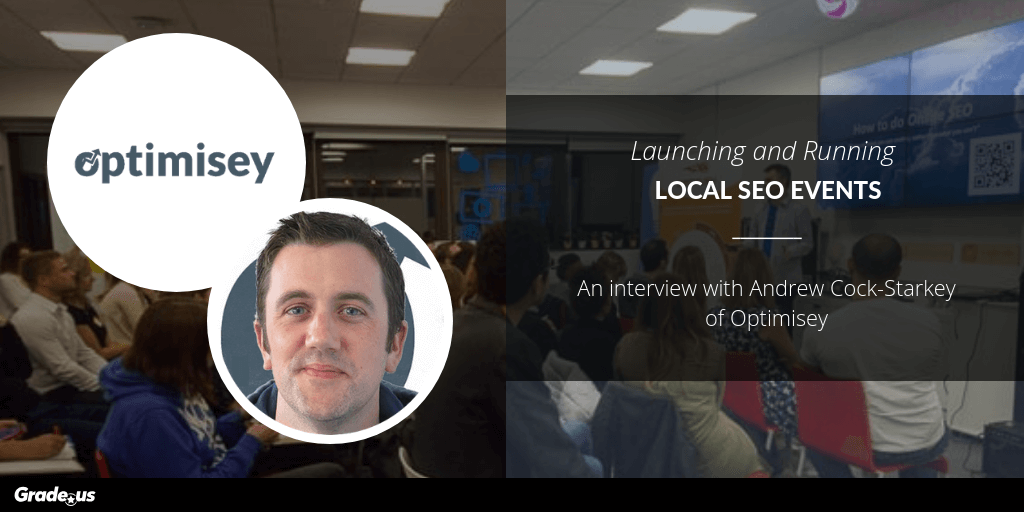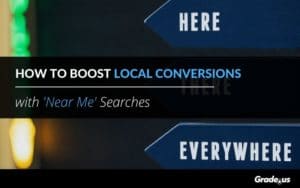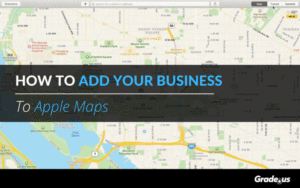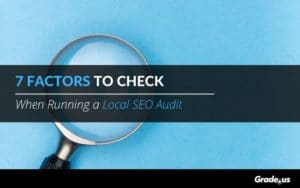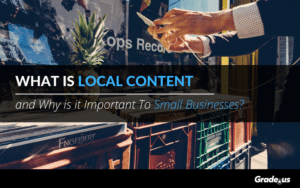If you don't live in one of the major cities running the big SEO and digital marketing events like SMX or MozCon, you might just want to start one of your own.
That's what Andrew of Optimisey did. The free Cambridge, UK-based MeetUp is running its 11th session on Thursday, May 23rd at 6:00 PM local time (you can sign up here).
If you're in the area and want to attend, sign up fast. Better yet, subscribe to the email list so you can get the heads-up about each new event right away. These seats fill up quick, and after talking to Andrew for a little while, it's not hard to see why.
On the inspiration for running SEO events
Carmen: What was your inspiration for starting free SEO events in Cambridge?
Andrew: So I attend Brighton SEO regularly. It's a really big conference here in the UK, and I really loved it. I really loved the vibe, and the people down there, and the people I met. The content was amazing. There were all these just phenomenal speakers. I thought, wouldn't it be great if this thing was just a little bit closer? So I just spoke to a couple of friends about it, saying, "I wish someone would set something up just a little closer to Cambridge."
I mean, it's not like compared to you guys in the States where the drive around the corner is like 5 hours, like traveling from Cambridge to Brighton is a 3, 4 hour trip, where it takes a big chunk of time to get down there and get back again. I wanted it a bit closer.
So I was talking to friends about it, and then I thought, well, why am I waiting for someone else to do it? I should see if I can do it myself.
On the very first SEO event meetup
Carmen: What was that first one like? Did it run pretty smoothly? Was it lots of stress?
Andrew: It was terrifying. I was really worried that nobody would show up. That it would just be me, talking to people about SEO, and it would be really embarrassing. Cause I'd sort of pulled in favors from friends saying, "If I do this would you speak at the first one."
I got a couple of friends who were going to come and speak at the first one, just to get it off the ground. I put it out on the web and did all the free advertising I could muster. I used things like Meetup and Eventbrite and spammed everyone on Twitter, and talked about it.
Everyone said, "Oh, this is a great idea." They kind of made nice noises and said they were going to come.
When the day came, it was actually terrifying. The doors opened five minutes before, and nobody was there. I was sweating quite a lot.
Carmen: But people did show up?
Andrew: Yeah, it turns out another local business had a big launch party. They had moved to a new office, and they were in the digital marketing area as well. They'd invited a lot of people from the area to come to their party, and have free champagne, and see the new office and all this kind of stuff.
Loads of people had come to that, planning to go on to my event afterwards.
That's why they were all cutting it so fine. So there I am, a paranoid event organizer sitting there at five minutes to going, "Why isn't anybody here yet?"
It got to like 5 minutes past, and then like 50, 60 people showed up.
On organizing the SEO event (agenda, speakers, etc.)
Carmen: That's great! So what does a typical agenda at one of these events look like?
Andrew: Usually it's just two speakers, because I do my events on a weekday in the evenings so people can come to it after work or after they've got kids or those kind of things. So it's usually two speakers who do like 20, 25 minute talks each, with a little bit of Q&A afterwards. Those two talks are bookended by ½ an hour of mingling and networking before and after.
So half an hour beforehand, everyone's sort of mingling and friendly and getting to know each other, and half an hour after where people discuss all the cool stuff they've learned.
Carmen: How do you get the speakers to come out and participate?
Andrew: I don't know! I keep asking all these amazing people, and they keep saying yes. It kind of baffles me a little sometimes. There's some people in the community who have been amazingly supportive.
I keep thinking, "They're never going to say yes." But they keep coming.
I had Marie Haynes come over. She was in the UK anyway, but she's based in Canada. I thought: wouldn't it be amazing if I could get Marie to come and speak at one of my events?
So I kept asking, and I kind of Twitter-stalk a lot of these people, and I interact with them on Twitter. So hopefully I'm not coming completely out of the blue. They know at least who I am.
I'd asked Marie and she said, "Well if I'm ever in the UK, then sure."
I knew she was coming over, coincidentally enough, to do a talk in Brighton, and she said, "Why don't I just come a day before and I can come to your event on Thursday?"
I keep asking them and they keep saying yes. Which I guess emboldens me a little bit to then ask more people.
On the feedback and improving the event
Carmen: Fair enough! So what kind of reactions are you getting to these events from your participants? Not just the speakers, but the people who show up?
Andrew: Broadly positive. It's an interesting world. It's not something I'd ever done before. The biggest event I'd organized before was my wedding, and that was quite a long time ago. I'd only done it once. I had someone extremely organized to help me, who became my wife.
So yeah, doing this event stuff was really new to me.
But reactions have been mostly positive. I guess like everybody, you get one hundred positive comments, and one slightly negative one, and guess which one I remember and focus on all the time?
The slightly negative one.
Broadly, people have been really nice and really supportive. I've done ten now, the last one was number ten. People come back. So I guess that's the most ringing endorsement. If they thought it was rubbish and not worth their time, then they wouldn't come back. I tend to get quite a few people who come again, and we still have a nice intake of new people each time. 50% of the audience have been to more than one event.
Carmen: That's great! Are there things you try to improve each time?
Andrew: Yeah, I've dabbled with a few different things. You asked about the agenda, and so we did one where we did a live website audit. Although we—so I got a couple of people that I'd again asked very nicely to give up their time—and we all did some homework ahead of time, so it wasn't quite as live as you might think it would be.
We picked apart a website in front of people, and explained what we were doing, and why, and why these things were important. That was an interesting thing to kind of mess with the agenda.
So the crazy thing...so it's a free event. I'm really lucky to have a couple of good local sponsors who help support the event, and that means I don't run them at a loss, which is nice. They cover the beer and travel costs and pizza and food. I've dabbled with that.
Because even though the event's free, the number one thing people complain about is the food!
Carmen: Oh, wow.
Andrew: It's a free event, and it's an amazing thing, and these international speakers come and give up their time, and everyone's like, "Ehn, there wasn't enough food." Or there's too much food, or the food..."Do you have vegan options," or, "I'm gluten-free, and I'm a vegetarian, do you have anything that was suitable for me?" And I'm just like, "Wow, okay. I'm trying! It's a free event, give me some slack!"
On the types of people who attend
Carmen: Who do you find is coming out? Is it more small business owners, other SEO specialists, marketing teams? Who is benefiting from it the most?
Andrew: So that surprised me a bit. I thought, initially, it would be much more people like me, like SEO nerds, but it's been a really interesting mix.
One of the reasons I first set down the meetings is, I was kind of inspired by Kelvin Newman and the stuff he's been doing with Brighton SEO. But I have, and it's probably a similar thing for anyone who works in web, I have friends that run their own businesses, or are part of small teams.
And they say, "Oh, you're the web guy, can you tell me how to do this?"
Or: "I got this email from this marketing company and they said they can do this for me. Is that true?"
All this kind of stuff.
There's SEO snake oil sellers out there everywhere. A lot of bad advice. So I was like, "Well, if I can do something to put a little bit more good advice out there, so people can see what good SEO looks like, then that's all good."
We do get quite a few people who come into the events who are DIYing it. They can't afford an SEO agency. They can't even afford an SEO consultant. They're just doing everything themselves.
Funnily enough, they're not very good at it.
The example I use is a jeweler. She makes amazing jewelry. She hand makes all this stuff. It's beautiful. She also does all of the bookkeeping for the business, and manages all the staff, and manages all the things that come with owning a brick-and-mortar shop.
She does all the marketing. She does all the SEO and emails. She's amazing at all those things, considering. But not as amazing as she is at making jewelry.
And, so, you know she's asking me about all this SEO stuff. "Oh, should I do this?" And I'm like, look, kind of a couple of hours I can tell her more stuff that helps her than she would learn from 500 emails and all this kind of junk you read and bad advice.
It's people like that that I enjoy helping the most, because they go from 0 to 60 pretty quick.
But you do get a handful of SEO nerds, and that makes it interesting with the agenda-juggling as well.
I try to have one talk that's kind of one of a 101 level, and one talk that's a bit deeper and darker so it's not just completely below the expectations of all those super-SEO nerds that come along.
On what's been learned and the value of the SEO events
Carmen: Is there something you've learned about the events you didn't expect to learn?
Andrew: Everybody likes pizza?
Carmen: It really is about the food!
Andrew: Yeah. And everybody complains about stuff even though it's free! But also I enjoyed it a lot more than I expected. I mean I didn't expect to not enjoy it, but I did enjoy it a lot more than I expected.
It was also a lot harder than I expected.
Everyone was all like, "Oh my god, running events is really hard."
And I think to myself, "How hard can it be?"
It was harder than I expected.
Carmen: Are you getting some value out of them you didn't expect to get?
Andrew: Yeah, I think so. I was not known in Cambridge, in the city. There's no reason anyone should know me now. But it's been a kind of nice side benefit, I guess. I do SEO consultancy as a kind of side hustle, as I think you guys call it in the States. On the weekends and evenings, with a view towards pursuing that more full-time.
It's definitely been helpful in that regard, getting my name out there, when people in the city are kind of like, "Who's the SEO guy?"
"Oh, it's that Andrew guy who does the SEO events. He probably knows about this stuff."
It's almost guilt by association, because these amazing people come and speak at my events, and they're like, "Well he must know about SEO, right? He knows all these amazing people."
Kind of a nice rub-off. If Marie Haynes comes to my events, and Barry Adams, he must be nearly as good as them. But considerably cheaper!
On the difference between online and offline events
Carmen: So now you've met a bunch of people in person. Is there anything you appreciate about doing that you find is better than doing it online?
Andrew: Yeah. The people that have come to speak at my event are amazing. I cover the costs for the event, venue, and food. I don't pay them, and I don't like that. It bugs me, a lot, because it does kind of rules a certain class of people out. If I'm asking people with a day job and multiple kids and limited free time, "Hey, do you want to come speak at my event, but I can't even afford to pay you petrol money. And if you need to stay overnight, good luck with that."
I'm effectively asking them to pay for the privilege of speaking at my event. That doesn't feel awesome.
But it never ceases to amaze me that people just say yes. So just meeting people in person and seeing how damned nice they are! They're always so great! They're all willing to come along and speak at these events just to spread good information and help people. There are lots of people who don't do that, and I totally get it. They say, "I would gladly come and speak at your event, here's my fee."
And I'm like, "I would love to pay your fee. Maybe when I'm super world famous and the size of Brighton SEO, who knows? But at this stage, I'm sorry, I can't afford to pay any fees."
In theory, my speaker roster should be empty, but people keep coming. They're still willing to come and help people for free, which is amazing.
And they're nice! They're all really nice.
You kind of think, "Oh, you know, these kind of really famous SEO people," at least one of them has got to be a little bit up on themselves, right?
But they're all really nice!
On general event advice and finding sponsors for the SEO events
Carmen: I've found the same, doing these interviews! If somebody else wanted to start a similar event in their areas, what advice would you give to them?
Andrew: It helps if you get some help. That was one of the things I did early on. Even just getting friends to come and speak at the first few events while you get yourself off the ground.
It helps if you - you don't have to be like Rand Fishkin, super-famous and everybody knows you - but it helps if you're a little bit known. I join in a lot of Twitter chats and things. I try and help people just because I enjoy doing that. But then, other people who approach you to talk at your events are like, "Oh yeah, I remember you, you were that person who helped that completely random stranger with this stupid thing they broke on Google Search Console, and you were just nice."
That kind of helps.
What else? So I've been to broader kind of marketing events in the area. There's a really great one in Cambridge called "The Marketing Meetup." Run by a chap who I've kind of met through these events called Joseph Glover.It's much more kind of broad-brush marketing.
So he gets twice the attendance I get. He's been running considerably longer. I offered to go and speak about some kind of 101 SEO stuff at his event. It was nice to kind of go off the back of that and say, "So, right, if you found this talk beneath your level, or if you're interested and want to find out more, I'm also running an event and it's just down the road. The next one is on this date."
That kind of helps spread the word.
And get good sponsors. Getting a good sponsor can really help.
I have a local recruitment company called Brand that sponsors my event. It's good for them, because a lot of people come to these kind of events because they want to learn a bit more or because they're looking for a new job. They come for the networking and then find people who are also interested in SEO. A lot of people have either got work for their agency or have received job offers from meeting people off some of the events.
So for Brand to be a supporter of the event, they're a supporter of a lot of local events, they're kind of amazing. That really helps. The events don't run over time a lot, so my wife is more tolerant of me spending time on it.
The other sponsor we have, a local media firm, Breadcrumb Media, videos the talks for us. They do an amazing job. That also helps with then getting speakers. I'm not like MozCon,
I try and play a role in helping new speakers get on the circuit. Everyone wants to be the next big conference speaker, but everyone has to start somewhere.
Unless you're phenomenal, you're not going to start somewhere on a stage with 3000 people. You kind of need to test yourself out a little bit. So I do try and get lesser-known speakers to chance their arm and learn at the events, see how they do, get some feedback, see if they love it, see if they hate it.
Having the videos of the talks is really good, because that's a selling point for all those people when, as I was saying, I can't even cover the costs of them traveling to the event. If they leave with a video of their talk, they can use that as a pitch for a bigger event where they do get paid.
I think that's why some of the speakers do it, because they're like: "I want to pitch one day to go speak at SMX or whatever it is." And what SMX wants is evidence of them being a good speaker. If they go to my event and leave with a nice video in their pocket of them speaking at an event in front of 50, 60 people, that gets them closer to where they want to get to.
Carmen: Now on the subject of sponsors, is there anything you've learned about working with sponsors that you can share with others who might be interested in doing this?
Andrew: Yeah, so I've had lots of people, the sponsors I've had, I've been really lucky with, and they've been really great from Day 1.
Once the events got a little more established and we started getting international speakers coming in, we made some great. Well I, it's just really me. I make that mistake all the time trying to sound bigger.
When International-grade speakers show up, more sponsors come forward. But some sponsors, like the ones I've got, are great. Some sponsors are not so great, and they just...I guess it's that kind of mutual back scratching thing.
What's in it for them?
If some of them are just happy to be associated with the event, then that's great. Some of them will say, "Well we want to be associated with this event, but you need to do all this other stuff. I'd like measurements of all your attendees."
And that's not cool. I don't want to do that.
Some events will happily do that, they'll sell attendee data, and that's kind of the price of the ticket. But I'm not really into that. If the attendees want to get into the sponsors, and let them know, "Hey, if you're looking for a new job you should talk to these guys, and they're great," then that's cool, "but if it's like okay we're going to sponsor your event but you need to stick our logo on this, and this tracking code, and this link to our website and it has to be a follow link and we want the email address of all your attendees, and you send out this email beforehand and this email after..."
It gets a bit like, "Okay...what is...is this okay?" I don't want to switch people off. The most important thing to me is the attendees. And that sounds really trite and really easy to say. Any conference organizer will say, "Of course my attendees are the most important thing in the world," (other than the trillions of pounds I'm making off the back of it...which I'm not).
But if the attendees stop coming because I annoy them with lots of spam and sponsor messages all the time, then the whole event dies. No sponsors are going to be interested if nobody comes.
On the biggest takeaway of running a local SEO event
Carmen: And then, finally, just to switch things up a little bit, what's the single biggest takeaway you've learned about your local SEO community from doing this, and what do you love most about doing SEO?
Andrew: What do I love most about SEO? I love finding problems. And then fixing them. Most of what I do is a lot of SEO audits. So I actually love pulling other people's work to pieces.
It's the same with anybody. When you write something yourself, you can never see your own mistakes. But I bet somebody like you can spot the misuse of syntax at like 600 paces.
Carmen: You're not wrong!
Andrew: In someone else's work. And I like doing that kind of stuff. I have my own website, and it's got its own holes in it. I shouldn't throw too many stones while I'm standing in my glass house, but looking at other people's websites and finding: this is broken, this is broken, this is broken, you wanna fix this, and this is broken too...I love doing that.
I guess what surprises me most about the local SEO community is that there is one. That was my first thing. If I'm going to this event in Cambridge, I wonder if anyone will give a damn. A few people told me I should broaden it out, make it more digital marketing, because SEO is really niche. I was like, well, I'm pretty sure I can do it. There's lots of stuff to talk about just with SEO, I'm really going to focus in on this.
Then I thought, maybe I should broaden it out, what if no one comes, I'm the only person in a 50-mile radius who cares about SEO. So I guess I am really surprised there's an SEO community, people who are interested in it and people who want to learn about things.
You can reach Andrew at @Optimisey on Twitter, or visit https:///optimisey.com.
About the Author
Raney C. Hudson
Raney C. Hudson is an independent content consultant with a 10+ year track record in the digital marketing industry.

